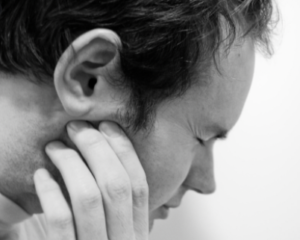Sleep Apnea
TMJ Specialist In Littleton, CO
The Best TMJ Specialist In Littleton, CO
Are You experiencing Pain in your Jaw, Head, Neck, TMJ?

TMJ related jaw pain
Temporomandibular Disorder (TMD) is pain associated with the joints at the top of the upper jaw.
Although popping and clicking is one of the more common signs of TMD, there are other signs and symptoms that you should also be aware of:
- History of open or closed lock (inability to open or close your mouth)
- Headaches/Migraines
- Tinnitus
- Jaw pain
- Head pain
- Neck pain
- Ear pain
- Eye pain
- Shoulder pain
- Back pain
- Ear congestion
- Face pain
Left untreated, these minor pains can be the beginning of a road that leads to chronic pain.
TMJ related head and neck pain can drastically reduce quality of life.
Although there are many potential sources and root causes of facial pain, it is not normal to suffer from headaches and migraines on a regular basis.
We have treated patients who have developed debilitating TMJ pain in a matter of days or weeks and others whose pain has built over the course of years or decades.
Headaches and migraines are two of the most common signs of TMJ problems. When the jaw joints are overloaded and inflamed, pain may begin to creep up the side of the head then migrate to the ears and around the eyes.
Similarly, when the muscles at the base of the skull are overworked, pain can develop on the side of the head then expand to the top of the head and eyes.
The TMJs (jaw joints) are located right in front of our ears. The back of the TMJ is the front of the ear. If the TMJs is out of position or inflamed, it can put pressure on the walls of the ear and create pain, fullness and/or congestion.
These are all common symptoms of TMD. Reducing the inflammation of the TMJs and helping the TMJs to get back into a healthier position will often reduce the ear symptoms as well.
Clicking and popping jaw joints are very common in patients who suffer from TMJ disorders (TMD’s). Not everyone who has clicking and popping joints will develop more severe problems, but some will. Here are some signs that your jaw popping could be progressing and should be evaluated:
- Inability to close your mouth (open lock)
- Inability to open your mouth at all (closed lock)
- Having to manipulate your jaw to get it to open
- Pain with opening or closing
- Inability to fully open your mouth
If you are experiencing any of the symptoms we have described on this page, please make an appointment to be evaluated for TMD.
Looking for a TMJ Specialist Near Me?
For more information about Jaw, Head, Neck and/or TMJ pain, and to set an appointment to discuss your situation, contact us at 303.797.0832.


